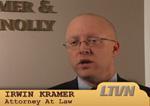Collecting on Judgments
ELIOT WAGONHEIM: There is nowhere to cash in a judgment. One cannot go to the bank and have them turn in into money.
IRWIN KRAMER: In many cases, it is easy to get a judgment against a deadbeat debtor, but collecting on that judgment, that is really the hard part.
ELIOT WAGONHEIM: Each state gives creditors, arrears, and their aquiver to use in order to turn a judgment into money and it is just a matter of figuring out which arrears was the right one.
IRWIN KRAMER: One way to cash in on judgments is to garnish their wages.
ELIOT WAGONHEIM: Most states will allow me to have a portion of that pay check. Not of all it, but a portion of that paycheck sent to satisfy my judgment.
IRWIN KRAMER: You can also go after other property, ceasing cars, bank accounts, collectables, or virtually anything of value.
ELIOT WAGONHEIM: Those things can be in most jurisdictions, ceased and sold to satisfy the judgment, same thing with real estate. A house can be foreclosed upon because of judgment, just like mortgage excess lean on property.
IRWIN KRAMER: In many cases, you are going to find yourself standing behind a long line of creditors, who already have leans on their property. So, the key is finding asset you can really use to satisfy your judgment.
ELIOT WAGONHEIM: Most states allow questions, which have to be answered by the creditor to discover asset and those questions can be, list your bank account, do you have a job, how much do you make, where do you live, do you own your home, or they are any mortgages on it.
IRWIN KRAMER: The problem with this process is that the very same debtor that ignore your lawsuit, is likely to disregard your hunt for your assets.
ELIOT WAGONHEIM: It is not as if one could simply send a series of questions to the guy that owes you the money and expect specific comprehensive replies by a return mail, it does not happen. The person will not answer and you will have to go to court to get a court order forcing them to answer. It takes a lot of time.
IRWIN KRAMER: The best time to ask these questions is long before you need the answers.
ELIOT WAGONHEIM: You want to take certain informations from that prospective customer, where they bank, where they are employed, and assets. It can provide you with information that will give you a heads up before you ever have to ask them questions and post judgment discovery, so the best place is to look to have your judgment satisfy.



